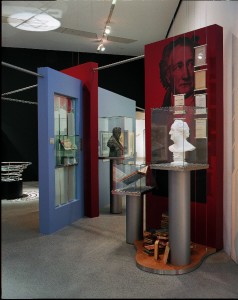A Visit to the Academy’s Reading Room
Why do we keep books like Muslime im säkularen Rechtsstaat (Muslims in Secular Rule of Law), Diaspora Identities, or z.B. 650 Jahre Rixdorf (E.g. 650 Years of Rixdorf) at the Jewish Museum? Answering this question is the task of the Academy Programs on Migration and Diversity. How to find these books, however, falls to the library.

Reading room of the Jewish Museum Berlin’s library
© Jewish Museum Berlin, photo: Mirjam Bitter
Imagine that you want to learn about social structures, clubs, and immigrant biographies in Berlin, particularly in Kreuzberg, to which you yourself moved from Hesse two years ago. After visiting the museum one fine Sunday afternoon, you take a look at the new Academy, where, you heard, a friend of yours recently attended an event about the ‘new Germans.’ The Academy is closed on the weekend, but a museum host informs you that it has a library. You return on Monday and ask in the reading room about Turks in Kreuzberg. The librarian would love just to tell you, “second shelf on the left, all the way to the back – what you’re looking for is right there.” Unfortunately, it’s not quite that simple. → continue reading
When you do a search of our library catalog for Goethe you could get this idea: 70 hits for works by or about the German poet (by contrast, Schiller only gets 16). And until a few years ago the impressive 1867 Cotta’schen edition of Goethe appeared in our permanent exhibition. Many people used to ask the visitor’s desk: “Was Goethe Jewish?” No, he wasn’t. But for many Jews he was the paragon of German culture, and his works symbolized membership in the German educated middle-class.

Former Goethe installation in the permanent exhibition
© Jewish Museum Berlin, photo: Marion Roßner
A few months ago, the Richard M. Meyer Foundation gave us more than 100 books by and about Richard M. Meyer himself. The son of a banker, art collector, and man of letters was a Goethe scholar. Meyer never acquired a proper professorship, but his 1895 biography of Goethe won awards and was published again and again – as a single volume, in multiple volumes, as a people’s edition and a reserved edition. According to the biography, Goethe saw “nationalities merely as transitional forms” (Volksausgabe [People’s Edition] 1913, p. 352). Statements like this illustrate the dilemma of German-Jewish assimilation during that period. If a Jewish reader of Goethe placed the poet’s cosmopolitanism in the foreground, he exposed himself to the accusation of misunderstanding the German essence of his writings. But when he explicitly recognized just this quality in Goethe’s language, his very right to have a say was contested. → continue reading
Or: Are You up for this Plan?
During the week of 21 to 27 October 2013, the Academy of the Jewish Museum Berlin, in cooperation with Kulturkind e.V., will host readings, workshops, and an open day for the public with the theme “Multifaceted: a book week on diversity in children’s and young adult literature.” Employees of various departments have been vigorously reading, discussing, and preparing a selection of books for the occasion. Some of these books have already been introduced here over the course of the last weeks.

“Meshugge” is one of the words Ace uses to comment on stuff in the children’s novel When Life Gives You O.J. Ace is the extraordinary grandpa of Zelda Fried aka Zelly, Zellybelly, Zeldale, or Zelly-bean. Grandpa has a plan that Zelly finds completely meschugge, as well as downright dumb. But what on earth is a girl to do? She has told her grandpa she is up for the scheme, and Ace would never understand if she were to back out now, or if she failed to muster the chutzpah* to see the thing through. And in any case, there’s still a chance grandpa’s plan may succeed. In which case Zelly’s dearest dream would finally come true—perhaps even before her eleventh birthday! → continue reading


